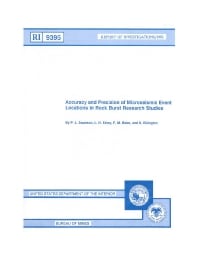Mining Publication: Accuracy and Precision of Microseismic Event Locations in Rock Burst Research Studies
Original creation date: January 1992
Authors: PL Swanson, LH Estey, FM Boler, S Billington
NIOSHTIC2 Number: 10011113
Denver, CO: U.S. Department of the Interior, Bureau of Mines, RI 9395, 1992 Jan; :1-40
Stability analyses of fractured and faulted rock masses require delineation of the position, extent, and orientation of geologic discontinuities. The size of the smallest active discontinuity that may potentially be resolved using the spatial distribution of microseismic event locations is limited by the accuracy and precision of the location methods. At a hard-rock mine in Coeur d'Alene mining district of northern Idaho, two data sets consisting of calibration blast signals from a known source site and origin time and microseismic event signals were recorded using a stope-wide accelerometer array. These seismic signals are used to quantify various sources of error in event location. Five factors influencing source location errors are examined in this U.S. Bureau of Mines study: (1) biases of the numerical source location techniques, (2) receiver array geometries, (3) uncertainties in receiver positions, (4) errors in picking arrival times, and (5) uncertainties in seismic velocity structure, including the effect of mine openings. In addition, synthetic data (accelerometer positions, travel-time picks, and wave velocity) are used to determine the effect of known systematic and random errors on source location calculations. It is shown that the commonly accepted association of minimum travel-time residuals with the best location solution does not necessarily hold true when there is a systematic error in seismic velocity. Recommendations are made for increasing the accuracy and precision of locations of microseismic events detected under similar field conditions.

NIOSHTIC2 Number: 10011113
Denver, CO: U.S. Department of the Interior, Bureau of Mines, RI 9395, 1992 Jan; :1-40